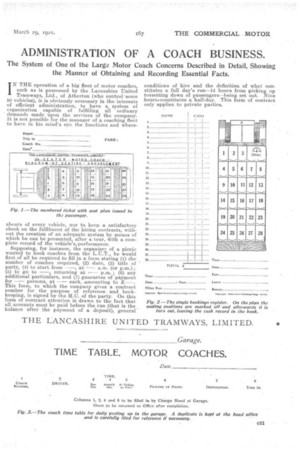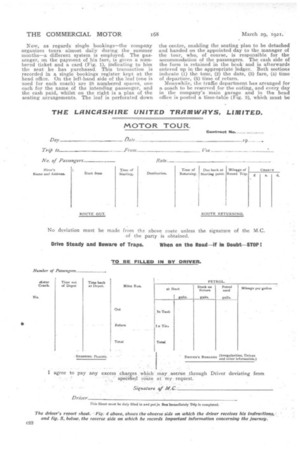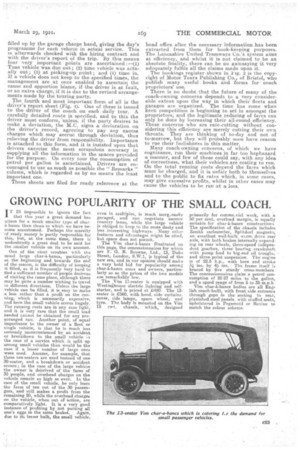ADMINISTRATION OF A COACH BUSINESS.
Page 9

Page 10

Page 11

If you've noticed an error in this article please click here to report it so we can fix it.
The System of One of the Large Motor Coach Concerns Described in Detail, Showing the Manner of Obtaining and Recording Essential Facts.
IN THE operation of a. big fleet of motor coaches, such as is possessed by the Lancashire United Tramways, Ltd., of Atherton (who control some 50 vehicles), it is obviously necessary in the interests of efficient administration, to have a system of organization capable of fulfilling all ordinary demands made upon the services of the company. it is not possible for the manager of a coaching fleet to have in his mind's eye the functions and where
abouts of every vehicle, nor to keep a satisfactory check on the fulfilment of the hiring contracts, without the creation of an adequate system by means of which be can be presented, after a tour, With a complete record of the vehicle's,performance.
Supposing, for instance, the organizer of a picnic wanted to book coaches from the L.U.T., he would first of all be required to fill in a form stating (1) the number of coaches required, (2) date, (3) title of party, (4) to start from ---, at -a.m. (or p.m.); (5) to go to —, returning at 7-pm.; (6) any additional particulars, and (7) guarantee of payment for — persons, at --each, .amounting to E This form, to which the company gives a contract number for the purpose of reference and bookkeeping, is signed by the M.C. of the party. On this form of contract attention i8 drawn to the fact that allaccounts must be p-aid before the run (that is the balance after the payment of a deposit), general conditions of hire and the definition of what constitutes a full day's run-14 hours from picking up tostsetting down of passengers—being set out. Nine hours-constitutes a half-day. This form of contract only applies to private parties.
Now, as regards single bookings—the company organizes tours • almost daily during the summer months—a different system is employed. The passenger, on the payment of his fare, is given a numbered ticket and a card (Fig. 1), indicating to him the seat he has purchased. This transaction is recorded in a single bookings register kept at the head office. On the left-hand side of the leaf (one is used for each coach) are 28 numbered spaces, one each for the name of the intending passenger, and the cash paid, whilst on the right is a plan of the seating arrangements. The leaf is perforated down the centre, enabling the seating plan to be detached and handed on the appointed day to the manager of the tour, who, of course, is responsible for the accommodation of the passengers. The cash side of the form is retained in the book and is afterwards entered up in the appropriate ledger. Both sections indicate (1) the tour, (2) the date, (3) fare, (4) time of departure, (5) time of return.
Meanwhile, the traffic department has arranged for a coach to be reserved for the outing, and every day in the •company's main garage and in the head office is posted a time-table (Fig. 3), which must be
filled up by the garage charge hand, giving the day's programme for each vehicle in actual service. This is afterwards checked with the hiring contract and with the driver's report of the trip. By this means four very important points are ascertained :—(1) Time vehicle was due out; (2) time vehicle was actually out; (3) at picking-up point; and (4) time in. If a vehicle does not keep to the specified times, the management are at once enabled to ascertain. the cause and apportion blame, if the driver is at fault, or an extra charge, if it is due to the revised arrangements made by the touring party.
The fourth and most important form of all is the driver's report sheet (Fig. 4). One of these is issued to the driver of the coach on each daily tour. A carefully detailed route is specified, and to this the driver must conform, unless, if the party desires to make a deviation, the M.C. signs a declaration on the driver's record, agreeing to pay any excess charges which may accrue through deviation, thus relieving the driver froth responsibility. Importance is attached to this form, and. it is insisted upon that drivers exercise the most scrupulous accuracy in supplying all the information in the spaces provided for the purpose. On every tour the consumption of petrol per gallon is ascertained. Drivers are encouraged to use as much as possible the " Remarks " column, which is regarded as by no means the least important one.
These sheets are filed for ready reference at the head office after the necessary information has been extracted from them for book-keeping purposes. The Lancashire United Tramways Co.'s system aims at efficiency, and whilst it is not claimed to be an absolute finality, there can be no gainsaying it very adequately fulfils all the claims made upon it.
The bookings register shown in Fig. 2 is the copyright of Motor Tours Publishing Co., of Bristol, who publish many useful books and forms for coach proprietors' use.
There is no doubt that the future of many of the coach-owning concerns depends to a very considerable extent upon the way in which their fleets and garages are organized. The time has come when keen competition is beginning to set in amongst the proprietors, and the legitimate reducing of fares can only be done by increasing their all-round efficiency. Those concerns who are rate-cutting without considering this efficiency are merely cutting their own throats. They are thinking of to-day and not of to-morrow, but they will probably soon have reason to rue their foolishness in this matter.
Many coach-owning concerns, of which we have cognizance, run their machines in far too haphazard a manner, and few of these could say, with any idea of correctness, what their vehicles are costing to run. On the total running costs depend the fares which must be charged, and it is unfair both to themselves and to the public to fix rates which, in some cases, may give excessive profits, whilst in other cases may cause the vehicles to be runat a loss.






































